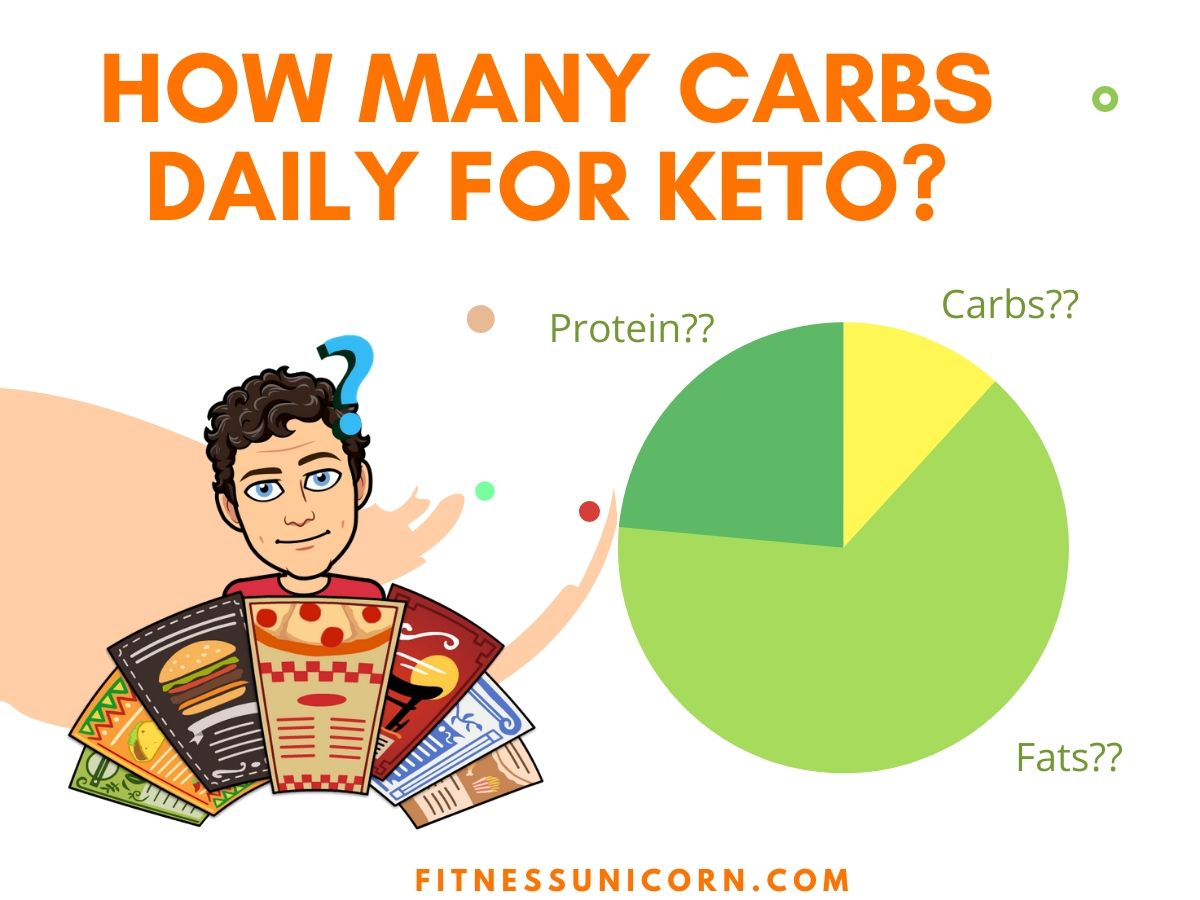If you’re new to keto, you must be wondering how many carbs ketosis requires for effective weight loss.
Rest assured, you have come to the right place.
Following our recommendations will turn you into a fat-burning machine in no time!
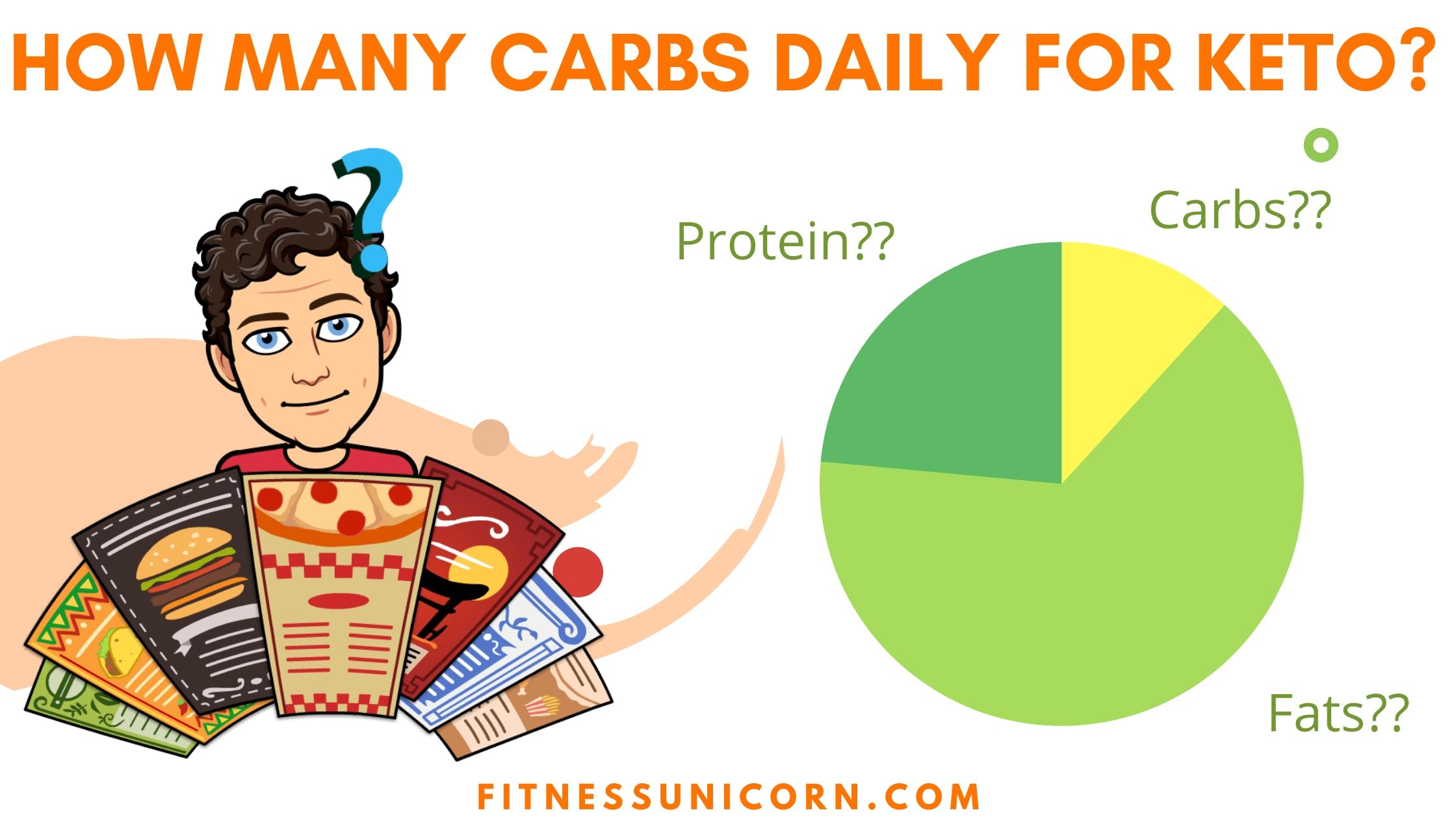
Many researchers and industry experts have proved that the keto diet is highly effective to shed pounds quickly.
Getting into ketosis requires eating a high fat, moderate protein, and low-carb diet.
(Read our guide: FREE Keto Diet Plan for Complete Beginners)
You might already know that the ideal amount of daily carbs is different for each person. Some of us can easily get into ketosis on 50 grams of total carbs per day while others might need to limit daily intake to 20 grams.
So how do you determine the perfect amount of carbs for you? Read on to find out everything there is to know.
What is Ketosis in a Keto Diet?
If you have landed here, then your main goal is to get rid of excess fat and reveal that perfect body which is hiding inside.
And the answer is ketosis.
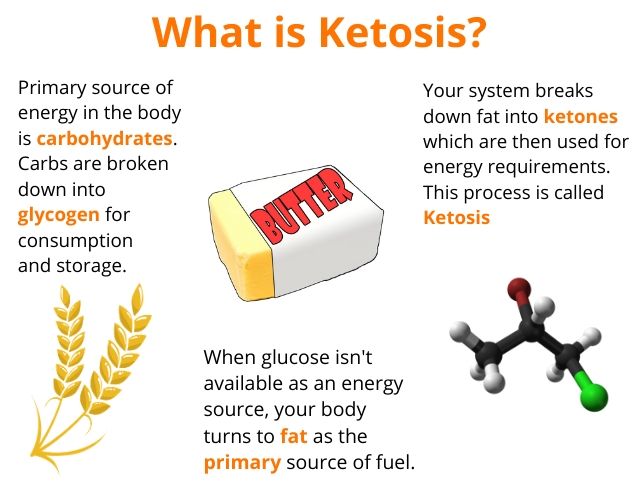
Ketosis is a metabolic state in which your body uses fat and ketones rather than glucose (sugar) as its main fuel source.
In ketosis, our body produces ketones at an accelerated speed. These ketones are made from the fats we eat and the fat already stored in our body.
Latest research shows that ketosis may also be helpful for type 2 diabetes and neurological disorders.
Reducing your net carb intake to 20–50 grams per day lowers the blood sugar and insulin levels, leading to the release of stored fat that your liver converts into ketones.
(Check out my Keto Diet Guide which will clear ALL your queries about this magical high-fat diet.)
What are Net Carbs in Keto Diet?
In your keto journey, you will often come across the term “Net Carbs” which simply refers to carbs that can be absorbed by the body.
Net carbs are the total carbohydrates minus your fiber intake (minus sugar alcohols if applicable).
So whenever you see words like 20 grams, 30 grams or 50 grams of carbs, we are talking about net carbs here.
To calculate the net carbs in whole foods, subtract the fiber from the total number of carbs. Similarly, to calculate the net carbs in processed foods, we will subtract the fiber and a portion of the sugar alcohols.
For example: A medium sized bell pepper has 8 grams of total carbs and 3.5 grams of fiber. Therefore, the net carbs come out to be 5.5. This is the number you need while calculating your daily carb intake in your keto diet.
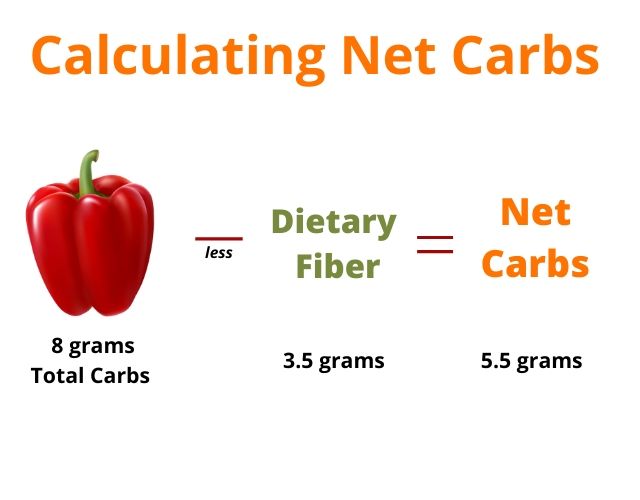
Now you know what are net carbs and have a fair idea of how ketosis works.
Let’s find out how many carbs ketosis requires to praise the keto gods In heaven and melt away that excess fat.
How Many Carbs Ketosis Requires?
As already stated, there are different factors which vary person to person when it comes to determining how many carbs ketosis requires.
However, there is a number that almost anyone can use to start getting results through keto. This magical number is: 35 grams of total carbs and 25 grams of net carbs.

Further, if you limit the net carbs to as low as 20, you are sure to see amazing progress in your fat loss journey. Keeping your carbs consumption at such a low level is a sure shot way to get into ketosis.
However, one shouldn’t focus only on carbs intake because there are other important variables as well, including fats and proteins.
Foods to Eat for Ketosis
Below is a list of foods which you can eat and the foods you must avoid while on a keto fat loss diet:
Foods Allowed in Ketogenic Diet
- Meats: lamb, poultry fish, beef, eggs, etc.
- Above the ground vegetables: broccoli, cauliflower, etc.

- Sweeteners: stevia, erythritol, monk fruit, etc
- Other fats: coconut oil, high-fat salad dressing, saturated fats, MCT oils, etc.
- High Fat Dairy: butter, hard cheeses, high fat cream , etc.
- Nuts and seeds: macadamias, walnuts, sunflower seeds, etc.
- Leafy Greens: spinach, kale, watercress, etc.
- Avocados and berries: blackberries, raspberries, blueberries and other low glycemic impact berries
Foods to Avoid in Ketogenic Diet
- Added sugars and sweeteners
- Sugary beverages: juice, soda, etc
- Traditional snacks: potato chips, pretzels, and crackers

- Pulses: beans, peas, lentils
- Grains: rice, pasta, and oatmeal
- Low-fat dairy products
- High sugar fruits: litchis, passion-fruit, pomegranates, mangoes, etc
- Starchy vegetables: corn, potatoes, peas
- Trans fats: margarine or other hydrogenated fats
- Alcohols: wine, beer, and other sweetened cocktails
Design your meals following the above guidelines and keep your daily carbs intake under 35.
Wondering about snacking options on the keto diet? Check out my keto peanut butter cookies recipe!
Factors Influencing Daily Carbs Requirements
How many carbs ketosis requires for you is also affected by various day to day factors.
You need to keep these factors in mind to make sure that daily carb requirements stay consistent and you don’t go off-track.
The following are some factors and what you can do to make sure they are working in your favor:
Exercise
There are two types of workouts: High Intensity Workout & Low Intensity Workout
The right kind of workouts at the right time will give you the best results.

High Intensity Training:
If you are just venturing into the keto diet, then you need to deplete your glycogen stores first. This will force your body to get into ketosis faster.
Try 30-45 minutes of high intensity workouts like heavy weight-training, lifting, cross-fit, high-intensity interval training, or even simply running.
Low Intensity Training:
Once your glycogen is depleted, start using low-intensity exercise to enhance fat burning and increase ketones in the blood.
Try 30-45 minutes of low-intensity activities everyday such as walking, cycling, dancing, rowing, etc. Do this first thing in the morning on empty stomach for better results.
More is not always better when it comes to exercise. You might be tempted to run for hours on the treadmill in order to boost your fat burn. Just make sure you have sufficient rest and allow your body to recover.
Stress from over training can raise cortisol levels in the blood, which impacts insulin and changes how many carbs ketosis requires for your weight loss.
Protein
The principal criteria for ketosis is low insulin levels in the blood.
But when the protein intake is too high, our body is flooded with amino acids. This leads to an increase in insulin levels. Due to this, meals very high in protein can prevent you from staying into ketosis or going deeper in ketosis. 
This is the reason why you shouldn’t solely rely on carb restriction in your keto weight loss process. For efficient ketosis, eat the right amount of proteins, fats and carbohydrates.
As a rule of thumb, you should obtain approximately 25% of your daily calories from protein. If you actively workout and indulge in weight training then it is best to increase your protein intake.
Keto Adaption
Once you begin your keto diet (and stick to it), your body will become keto adapted. In the process of keto adaptation, mitochondria (the energy powerhouse of the cell) becomes more efficient and starts replicating itself. This provides more and more cells with the ability to use ketones as their primary energy source, leading to greater fat burn.
Your body takes 3 to 6 months before becoming keto adapted. So ideally you should wait at least 3 months before experimenting with your carb intake.
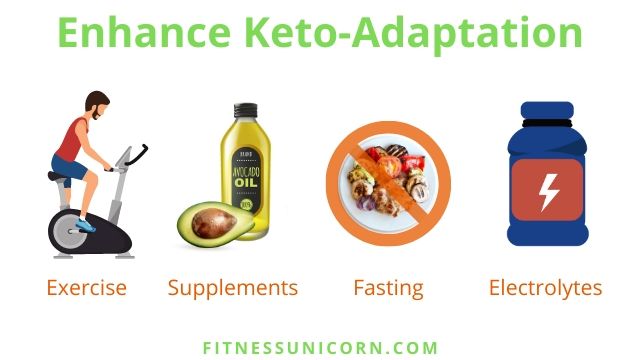 The more keto adapted you become, the more carbs you will be able to eat while staying in ketosis. You may also invest in a good keto fat burner to shorten your keto-adaptation period.
The more keto adapted you become, the more carbs you will be able to eat while staying in ketosis. You may also invest in a good keto fat burner to shorten your keto-adaptation period.
Types of Carbs
Different types of carbohydrates can affect insulin in different ways. It might lead to changes in how many carbs ketosis requires for you.
Having simple sugars from foods like white bread and juice will rapidly increase insulin and glucose, which can affect your ability to remain in ketosis.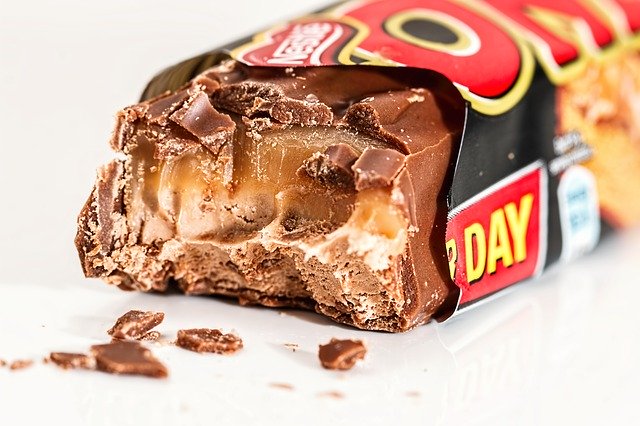
On the other hand, complex carbs are digested more slowly, and therefore will not impact your glucose and insulin much.
Stick to plant-based, low starch, and above the ground vegetable sources of carbs (such as such as kale, spinach, cauliflower, broccoli, cabbage, Brussels sprouts, cucumber, asparagus etc.). If you’re eating fruit, then you should stick with low glycemic fruit like berries.
(Bored with homemade meals? Check out our guide on Keto at Wendys.)
Stress and Emotions
Emotional stress can cause an insulin reaction to the stress hormones, hence glucose levels rise on a stressful day.
The increased sugar in blood can shut down ketone production required for ketosis. It doesn’t matter where the stress comes from (thoughts, actions, situations, etc.) – they all cause the same hormonal response.
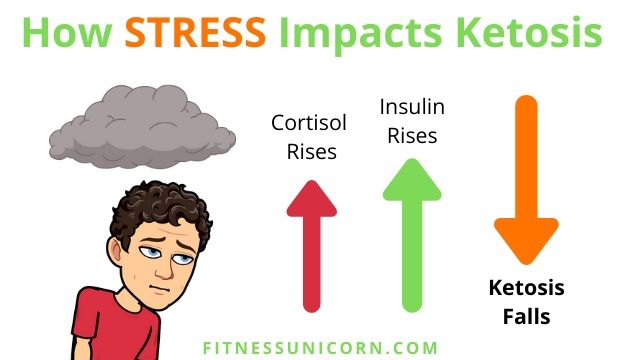
Common Stressors which might Hurt Your Keto Progress:
- Over training in the gym
- Having very less food
- Overthinking about future
- Pondering over past mistakes in life
- Too much work without breaks
Remedies for Stress to Stay in Ketosis:
- Practice yoga/meditation to regulate cortisol levels
- Improve sleep quality by getting sun exposure in the day and following a disciplined sleep cycle
- Workout in moderation, don’t over train
Finding ways to manage stress, such as long walks, meditation yoga, deep breathing, and practicing gratitude, can help you regulate cortisol and stay into ketosis within the same carbs limit every day.
Now you know the factors which affect how many carbs ketosis requires every day for you. So you can make the appropriate lifestyle changes based on these factors to keep your daily routine stable and stay in ketosis.
For example: If your sleep is disrupted one night or if you have mentally exhausted yourself due to work pressure, give yourself a buffer by reducing some carbs that day. With some experimentation, you’ll get a very clear idea of how to manage these factors effectively for maximum ketosis.
Key Takeaway
Every individual will get different results with the same carb limit. This is true because ketone levels in the body depend on our activity levels, protein intake, stress, keto adaptation and the types of carbs consumed.
If you are wondering how many carbs ketosis requires then the one word answer would be 35 grams of net carbs. This magic number will give great results to majority of people. And if you want to go deeper into ketosis, then you can try limiting to 20 grams of carbs a day.

